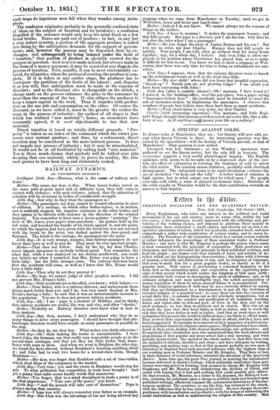RAILWAY DYNAMICS.
AN UNSCIENTIFIC DIALOGUE.
Intelligent Little Boy—Mamma, what is the came of railway acci- dents ?
Mother—The cause, my dear, is this. When heavy bodies travel on the same path at great speed and at different rates, they will come in contact with violence; with such violence, indeed, that the attraction of cohesion will be overcome in bodies of considerable strength.
Little Boy —But why do they treat the passengers so ? Mother—The passengers, my dear, cannot be treated otherwise in cases of collision. If a carriage, on which other bodies repose, is in motion, and is suddenly stopped, the impetus continues in the other bodies, and they appear to be thrown with violence in the direction of the original impetus. You remember to have seen a house-painter "graining" the door of Mr. Jones, your papa's wine-merchant : the grainer held up his left wrist, and knocked the handle of his brush against it, and the paint, to which the impetus had been given with the brush but was not arrested with the brush by the wrist, was dashed against the door-panel, and flattened. The brush is the carriage, the passengers are the paint. Little Boy—It is very strange, mamma, that railway-managers do not know these laws as well as you do. They must be very ignorant people.
Mother—That does not follow. And, by the by, my dear Charles, never impute ignorance to anybody without proof. You remember, the other day, while I was employed on my charity needlework, you could not believe me when I remarked that Mrs. Evans was going to have a little baby : but the little stranger came. The railway-directors know that the accidents will come, as well as I knew that Mrs. Evans would have a little baby.
Little Boy—Then why do not they prevent it ?
Mother—My dear, we cannot judge of other people's motives. I did not prevent Mrs. Evans's baby. Little Boy—Only accidents are so dreadful, you know; while babies-
Mother—Your father, who is a railway-director, and understands these things much better than you and I do, was very much shocked at Mrs. Evans's having a baby : he said that it was an unwarrantable increase to the population. You see he does not prevent railway accidents.
Little Boy—Ah! I see : papa is a student of Malthus, and he thinks that railway accidents are useful, like war, and vice, and other "checks."
Mother—Probably so. Railway directors must know what is best in these matters.
Little Boy—But, then, mamma, I don't understand why they do so many things to drive away passengers. I should have thought that phi- lanthropic directors would have caught as many passengers as possible in the trap.
Mother—So they do, my dear boy. What makes you think otherwise ?
Little Boy—Oh! their making the trains so uncomfortable. I have heard John, the footman, say that really very respectable people go in the second-class carriages, and that yet they are little better than horse- boxes with seats in them. And when we went to Brighton the other day, we found the fares altered, without Bradshaw's knowing anything about it ; and John had to wait two hours for a second-oleos train, though Bradshaw-
Mother—My dear, you forget that Bradshaw sells a set of time-tables, which rival those of the companies in the market.
Little Boy—Very true; yes, and the errors in Bradshaw would stop his gale. To what perfection has competition in trade been brought ! And yet a penny, time-table seems hardly worth that manoeuvre.
Mother—You forget, that to a mind disciplined in trade a penny is of the first importance. " Take care of the pence," you know.
Little Boy—" And the pounds will take care of themselves." Papa is always saying that, mamma.
Mother—I hope you will always remember your father as an example. Little Boy—But what was the advantage of our not being allowed any
stoppage when we came from Manchester on Tuesday, until we got to Wolverton, hours and hours past lunch-time ? Mother—Indeed I do not know. We cannot always see the reasons of things on the surface.
Little Boy—I have it, mamma t It makes the passengers hungry, and that kills people. But papa is a director, and I am his son : why does he not alter the rules when I am a passenger ?
Mother—Do you forget the story of Junius Brutus and his son ? But you are in error, my dear Charles. Hunger does not kill people so quickly. Poor people, I am told, often go without food for many hours together ; nay, fbr a whole day, I believe. And even John is often em- ployed, in the position where Providence has placed him, so as to make it difficult for him to eat. You know we had so short a stoppage at Wol- verton, that there was only time for him to bring us refreshment for our- selves.
Little Boy—I suppose, then, that the railway directors want to knock up the refreshment-rooms as well as the rival time-bills.
Mother—My dear child ! where did you learn that dreadful expression, " knock-up " ? Surely you are not growing vulgar ? I am afraid you have been conversing with John ?
Little Boy [after a contrite silence]-0h ! mamma, I have found it ! I noticed, in the booking-office, over the pay-place, was a paper saying " Insurance-tickets here" : the accidents must be intended to cause the Bale of insurance-tickets by frightening the pa gingers. I observe that numbers of people buy tickets since there have been so many accidents. Mother—Your observation is very acute, my dear Charles.
Charles [with increasing eagerness]—Yes, mamma ; and little Regi- nald Briggs thought that insurance-tickets saved one's own life, like a life- buoy at sea. As if anything co{ir; secure your life on a railway!


























 Previous page
Previous page